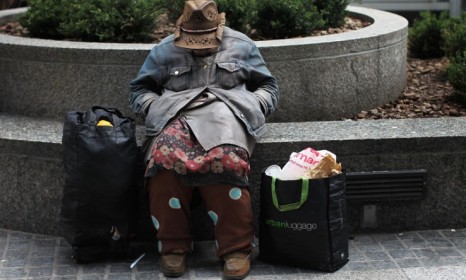America's highest poverty rate in nearly 20 years: By the numbers
An increasingly bleak job market is having devastating effects on the nation's families

A free daily email with the biggest news stories of the day – and the best features from TheWeek.com
You are now subscribed
Your newsletter sign-up was successful
The economic news isn't getting any better. Data released Tuesday by the U.S. Census Bureau shows that America's poverty rate is at its highest point since 1993. Indeed, the poverty rate "is now approaching levels not seen since Lyndon B. Johnson launched the War on Poverty in 1965," says Don Lee in the Los Angeles Times. Here, a brief guide, by the numbers:
22,113
Poverty line, in dollars, for a family of four
The Week
Escape your echo chamber. Get the facts behind the news, plus analysis from multiple perspectives.

Sign up for The Week's Free Newsletters
From our morning news briefing to a weekly Good News Newsletter, get the best of The Week delivered directly to your inbox.
From our morning news briefing to a weekly Good News Newsletter, get the best of The Week delivered directly to your inbox.
11,139
Poverty line, in dollars, for an individual
15.1
Percentage of Americans living below the poverty line in 2010
A free daily email with the biggest news stories of the day – and the best features from TheWeek.com
14.3
Percentage of Americans living below the poverty line in 2009
11.3
Percentage of Americans living below the poverty line in 2000
46.2 million
Number of Americans living in poverty in 2010, the most in the 52 years the Census has been tracking this statistic
49.9 million
Number of Americans without health insurance, up from 49 million in 2009
16.3
Percentage of Americans without health insurance, approximately the same rate as in 2009
49,445
Median household income for 2010, in dollars. That's down from $50,599 in 2009.
11
Percentage increase in income for middle-class families from 1980 to 2010
42
Percentage increase in income for the wealthiest 5 percent of Americans during that same period. "It's not that the American economy has necessarily performed badly," says Paul Osterman, an MIT labor economist. "As a country we're richer over that period, but there's been this real shift in where the income has gone, and it's to the top."
Sources: BusinessWeek, CNN, Los Angeles Times, New York Times
-
 The ‘ravenous’ demand for Cornish minerals
The ‘ravenous’ demand for Cornish mineralsUnder the Radar Growing need for critical minerals to power tech has intensified ‘appetite’ for lithium, which could be a ‘huge boon’ for local economy
-
 Why are election experts taking Trump’s midterm threats seriously?
Why are election experts taking Trump’s midterm threats seriously?IN THE SPOTLIGHT As the president muses about polling place deployments and a centralized electoral system aimed at one-party control, lawmakers are taking this administration at its word
-
 ‘Restaurateurs have become millionaires’
‘Restaurateurs have become millionaires’Instant Opinion Opinion, comment and editorials of the day